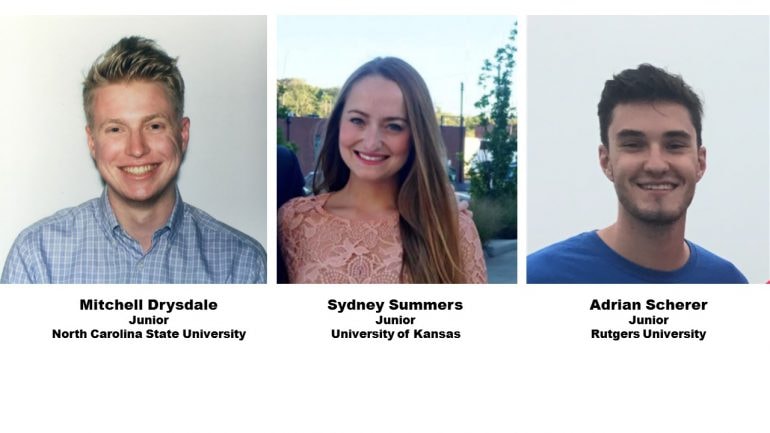One of the primary goals for the Pearson Student Insiders, Pearson’s online college student community, is to educate students on career skills. Recently we hosted a video call where Student Insiders Mitchell Drysdale, Adrian Scherer, and Sydney Summers shared their experiences about internships.
Finding Opportunities
Where do you find internship opportunities?
Mitchell (junior, North Carolina State University) “Our career center has a website that posts all the internship opportunities for our university and whether or not they’ll be at the career fair. I also went to websites of companies that were not there (at the career fair) to see if they had any opportunities posted.”
Sydney (junior, University of Kansas) “I ask my network – family and friends. I also looked on Indeed.com; Glassdoor.com and LinkedIn. I went to my school’s career fair. It was fun to get out there and network with people from different companies.”
Adrian (junior, Rutgers University) “I like to try to keep as many doors open as possible when looking for internships. Job sites, networking/contacts, and Rutgers career services and career fair all have been helpful when searching for internships.”
A lot of Insiders reach out and say they want to do informational interviews but they are not sure how to get started. How do you handle setting up informational interviews?
Adrian – “I find that reaching out to contacts through my LinkedIn network is one of the best ways to try to set up informational interviews. Finding a person and shooting them a quick message asking to meet up is usually pretty effective.”
Mitchell – “I use the LinkedIn messaging feature. I tell them ‘I notice that you have experience in this. I’d love to pick your brain and find out how you got to where you are.’ A lot of people like helping other people, especially on LinkedIn, so don’t feel like you’re being weird. Everybody does it.”
Tailoring Your Resume
How do you figure out what pertinent keywords to use to tailor your resume for different positions?
Sydney – “I review my resume and look for things that correspond with the job description and also things I can leave off. You have to highlight the big stuff and it’s okay to brag about yourself in that sense. Each resume gets looked at for about 5 seconds so you have to have stuff that stands out.”
Adrian – “The most important thing to look at is the description of the job you are applying for. Once you see what exactly the company is looking for in its interns, you should tailor your resume to best reflect the ideal version of yourself for that specific position.”
Mitchell –“Identifying those keywords is important for your resume and will literally get you through any interview. I saw one interviewer actually checking off a list as I said certain things.”
Interview Tips
How do you pump yourself up to stand out during your interview?
Sydney – “I like to mentally prepare. Use positive self-talk. Tell yourself “you got this”! Be optimistic. If you’re pessimistic, it will show through.”
Mitchell – “Play some music that you like, something that loosens you up and gets those nerves out. Just sitting in a silent car rehearsing what you’re going to say is just going to mess you up. Take deep breaths. Know you’re here for a reason. You’re just the same, if not better than all the other candidates.”
What do you take into the interview with you?
Adrian – “A pad-folio with paper, multiple copies of my resume, a copy of the description of the job, and at least 7 good questions that I would be comfortable asking if not addressed in the interview. I always make sure to ask the interviewer for permission to take notes.”
Mitchell – “And also a pen. It’s not only to take notes during the interview. Having something in my hand helps me relax. I also have a bottle of water with me. It’s a great way to give yourself a few extra seconds before answering a question. When someone asks a question, take a sip of water to give yourself a couple of seconds to collect your thoughts.”
Sydney – “Bring extra resumes. I power down my phone and put it in a small purse because I don’t want my phone to be visible. I write out about 10 or 15 questions ahead of time. Some will be answered during the interview but I know I’ll have one or two to ask at the end. It doesn’t look good to not have anything to ask at the end of the interview.”
How bold are you at the end of the interview? What are you doing at the very end of the interview to get that offer?
Mitchell – “I had a little elevator pitch planned. About a 15 second thing that I can say about why I should get this internship.”
Sydney – “Confidence in your closing statement is key. If you’re not showing why you fully want it and are fully qualified, why would they hire you? It’s the time for you to take control to say what you want. Don’t just say ‘thank you’ and hope for the best.”
Mitchell – “And think about your handshake! Practice shaking hands. Practice making eye-contact. A poor handshake ruins your chances almost immediately. Go in strong. Don’t be too hard, don’t go too long.”
What do you do to follow-up after an interview or networking chat?
Sydney – “Follow ups are huge. I like to handwrite a thank you note. Get it done pretty quickly afterwards. Within 24 hours for sure. Be sure to email, too, because it can take a few extra days for a handwritten note to arrive.”
Mitchell – “Look for a way to include a personal connection in your follow-up. I learned during my interview that the interviewer’s son went to the rival high school of the school I attended so I made sure to mention that by saying ‘good luck to Nick at XYZ High School’. That personal touch may seem kind of corny to you but it goes a long way in making a good impression and shows that you were listening.”
Making the Most of Your Opportunity
Once you have an internship, what do you do to stand out? How can you be a star candidate for their next hire?
Sydney– “My internship supervisor appreciated it when I asked questions about the industry and asked for additional assignments. I also asked her about how she started out and how she got to where she was. People love talking about themselves. It helps break the ice.”
Mitchell – “Don’t act like you know everything, especially when you first get there. Meet new people, connect with other interns. It shows you are willing to collaborate with your peers and communicate with your superiors. Never turn down a cup of coffee and never stop asking others to have a cup with you. Don’t be shy to ask. A lot of people are flattered by it. You are taking initiative. It shows you have a mindset of longevity with the company.”
Adrian – “Ask for feedback. Ask your boss and your co-workers, ‘what am I doing well, what can I improve on?’ It can go a long way to helping you get the most out of the experience. That’s what internships are all about. You’re trying to get experience and improve your skills.”
Find more helpful content like this, plus fun employability challenges by joining the Pearson Student Insiders today! To learn more about the program and apply, click here.
If you’ve had an internship, what advice do you have for students who are just beginning the process? Share your tips in the comments below.

